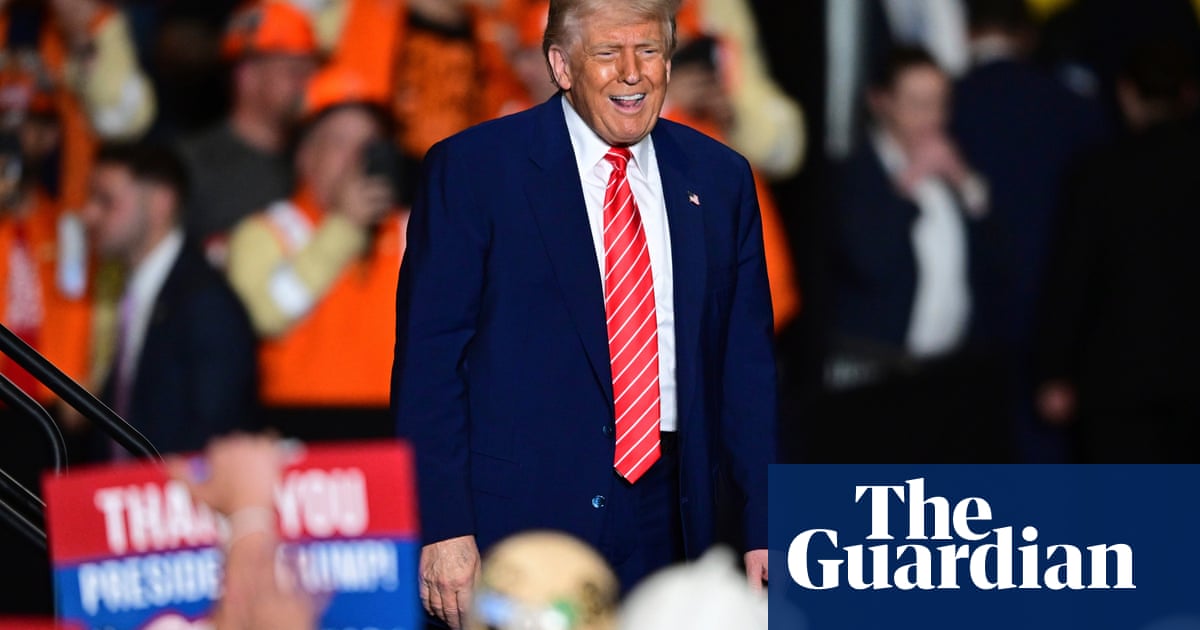Good morning.
The US has doubled tariffs on foreign steel and aluminum imports to 50%, pressing ahead in the face of criticism from key trading partners with a measure that Donald Trump says is intended to revive the American industry.
After imposing and rapidly lifting tariffs on much of the world, only to reduce them, the president last week refocused on the global steel and aluminum markets – and the dominance of China.
Trump signed an executive order formalizing the move on Tuesday. Higher tariffs “will more effectively counter foreign countries that continue to off-load low-priced, excess steel and aluminum in the United States market and thereby undercut the competitiveness of the United States steel and aluminum industries”, the order said.
Does the tariff apply to all trading partners?It applies toall trading partners except Britain, the only country so far that has struck a preliminary trade agreement with the US during a 90-day pause on a wider array of Trump tariffs.
The Palestinian Red Crescent Society has detailedthe harrowing account of one of its paramedics, who told the organisation he heard Israeli troops shoot first responders while they were still clinging to life.
Asaad al-Nasasra, 47, was one of two first responders to survive the 15 March attack on a convoy of emergency vehicles in which 15 medics and rescue workers were killed.
He told the PRCS that after the attack in Gaza he was detained and tortured for 37 days by Israeli forces.
What else did he say?In the account he gave to colleagues, Nasasra said some of the paramedics survived the initial assault and were calling for help when they were shot dead, the PRCS said.
US immigration authorities havetaken into custody the family of Mohamed Sabry Soliman, the man who allegedly used incendiary devices to attack a Colorado rally for Israeli hostages, the Department of Homeland Security said.
Twelve people were wounded in Boulder on Sunday when Soliman, 45, allegedly attacked people at a rally calling for the release of hostages in Gaza in what the FBI called an “act of terrorism”. During the attack, Soliman allegedly shouted: “Free Palestine.”
The Trump administration quickly seized on Soliman’s immigration status to push its mass deportation agenda. Soliman, who was born in Egypt, was in the US on an expired tourist visa afterentering the country in 2022. He applied for asylum that year and received work authorization that later expired.
What has Trump said?The US president has blamed the attack on his predecessor, arguing it was the result of Joe Biden’s “ridiculous open border policy”. Since the attack, other Republicans have also politicized the events, blaming Democrats for the attempted murders.
Republican firebrand Marjorie Taylor Greene hasadmitted thatshe did not read Donald Trump’s taxand spending bill before voting for it– and thatshe would have voted against it had she read it thoroughly.
Elon Musk, meanwhile, has opened a new rift withTrump by denouncing thebillasa “disgusting abomination”for causing the deficit to grow dramatically.
The world will never forget the Tiananmen Square massacre, the US secretary of state and the president of Taiwan have said on the36th anniversary of a crackdownthat China’s government still tries to erase from domestic memory.
Ukraine hasdetonated a massive underwater blasttargeting the key bridge connecting the Russian-occupied Crimean peninsula to Russia, damaging its underwater supports.
Millions of legal immigrants may be left unable to work after the US Social Security Administrationquietly instituted a rule change to stop automatically issuing them social security numbers. Trump has falsely claimed these programs are being used to attract unauthorized immigrants to vote for Democrats.
The senator and two-time Democratic presidential hopeful Bernie Sanders is on tour with Alexandria Ocasio-Cortez trying to build a new progressive movement. Hespoke to the Guardian about why he thinks Republicans are scared to speak upand what went wrong for Kamala Harris and the Democratic party in 2024: “They don’t have much of a message for working people, other than to say Trump is dangerous. I think that’s just not enough.”
Umar Patek, a convicted bombmaker involved in the deadly 2002 Bali bombings, says that he is now a changed man. Launching his own coffee business on Tuesday in the city of Surabaya, the former member of the al-Qaida-linked terror group Jemaah Islamiyah says he is nowmore interested in “brewing peace”. Patek was sentenced to 20 years in prison in 2012 for his role in the bombings, which killed 202 people, in what remains Indonesia’s deadliest terror attack: Patek helped mix 50kg of the 1 tonne of explosives used in the bombs, while prosecutors said he helped assemble suicide vests, detonator cords and boosters. At Tuesday evening’s launch, Husnul Khotimah, an Indonesian survivor, confronted Patek about his crimes.
A 200-year-old illustrated condomwill go on display with Dutch golden age masters in Amsterdam this week, after the 19th-century “luxury souvenir” became the first-ever contraceptive sheath to be added to the Rijksmuseum’s art collection. The condom, which was probably made of a sheep’s appendix circa 1830, is thought to have come from an upmarket brothel in France.
First Thing is delivered to thousands of inboxes every weekday. If you’re not already signed up,subscribe now.
If you have any questions or comments about any of our newsletters please emailnewsletters@theguardian.com
